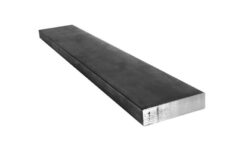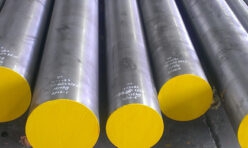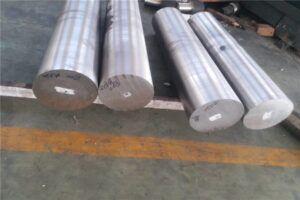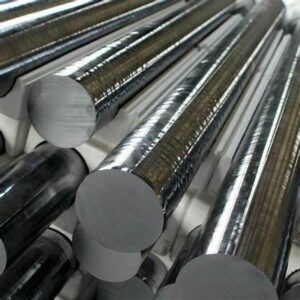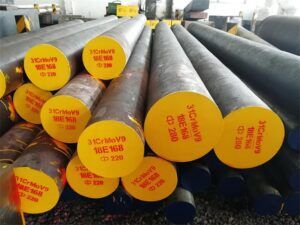AISI 9260 Spring Steel
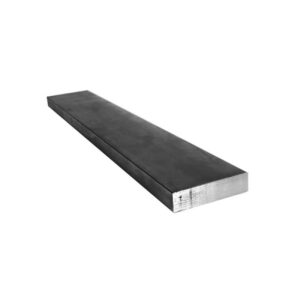
AISI 9260 Spring Steel
Alloy Steel 9260, also sold AISI 9260, is a high-silicon, spring alloy steel. It offers users outstanding corrosion resistance, hardness, toughness, and strength. Alloy Steel 9260 is machinable in the annealed condition, and is weldable by most common methods except oxyacetylene welding. You will find Alloy Steel 9260 in a wide variety of applications, most of which demand resistance to bending and failures. Alloy Steel 9260 is used in a number of different products and industries including:
Airplanes
Military weaponry
Rail transportation
Bridges
Machine tools
Knives and swords
All About 9260 Steel (Properties, Strength, and Uses)
Physical Properties of 9260 Steel
9260 steel is given its four-digit name by the joint naming index created by the AISI and SAE. To learn more about this naming scheme, as well as the differences between steel grades, review our article on the types of steels.
The first digit designates the class of the steel alloy- that is, what the major alloying components are (besides carbon). For this steel, the “9” shows that this steel is of the silicon-manganese class of alloy steels. The second digit represents the percentage of these major elements; the “2” in 9260 steel, therefore, means this class is around 2% silicon/manganese. Finally, the last two digits represent the carbon percentage in the steel, in increments of 0.01%. Using this rule, 9260 steel is 0.60% carbon. The exact chemical composition of 9260 steel is much more specific, (seen below with tolerances), but its name gives a good idea as to its general makeup.
9260 steel can often be found as AISI 9260 steel and is considered a high-silicon spring alloy steel. This means it has good spring characteristics and is useful for its flexion as well as its resilience to deformation. It is easily machined when annealed and can be welded by all methods except via oxyacetylene torches. It is generally resistant to corrosion and is hard enough to resist local surface deformation. It is forgeable as well as heat treatable and responds well to quench hardening. 9260 steel has a density of 7.85 g/cm3 (0.284 lb/in3) and is most often found in the form of round bar, plate, tube, and sheet stock. Its optimal spring characteristics make 9260 steel an exceptional choice when producing leaf and conical springs but can also be used in many other areas as a high-strength alloy.
Applications of 9260 Steel
Type 9260 steel is a versatile spring steel; its high strength, corrosion resistance, hardness, and workability lend it to any application which favors resilience. It is most commonly used in leaf and conical springs, but some other notable applications can be seen below:
Aircraft parts
Military technology
Bridge supports
Machine tools
Blades and cutlery
Railway applications
HEAT TREATMENT
Annealing: To produce a structure of coarse to fine spheroidite, parts should be austenitized at 1400ºF (760ºC) and cooled to 1300ºF (705º) at a rate of 10ºF/hr., or alternately cooled to 1225ºF (660ºC) and held for 10 hours as an iso-anneal.
Normalizing: 1650ºF (900ºC) and air cool. This will be an important treatment for this grade.
Hardening: Austenitize at 1525-1580ºF (830-860ºC) and water quench.
Tempering: 880-970ºF (470-520ºC)
Machinability: Parts could be machined following a spheroidize anneal
Weldability: The grade would not normally be welded.
9260 carbon steel, this steel is used to manufacture knives and swords. Flexibility is one of its main qualities, which is used in the manufacture of swords and fencing foils, also for its high resistance to impacts. Easy to work, with very good results.
Its main features:
– High flexibility.
– Medium hardness.
– Average cutting edge retention.
– Up to 61 HRC
– High machinability.
Chemical composition (%): C: 0.65, Si: 1.80, Mn: 0.80, Cr: 0.35
This steel is recommended both for beginners as professionals, the degree of difficulty of work is low. Supplied annealed (soft), to facilitate the work.
9260 has the capability to be a harder blade. The silicon alloy increases shock resistance and if tempered correctly is a superior material. The incredibly crafted blade that has both strength and flexibility. It is an excellent material for katanas. It is highly durable in most dojo applications and extremely resistant to bending and failures. The use of 0.6% carbon allows this blade to be sturdy enough for tatami omote yet forgiving enough to resist dangerous chipping on rigid targets.
Relevant standard:
JIS SUP6 / SUP7
EN/DIN 10089 60SiCr7
ISO 683 60SiCr7
NF 60Cr7 / 25II60
BS Z51A60
OCT 60C2
GB/T1222 60Si2Mn
Chemical composition
| C | Si | Mn | S | P | Cr | Ni | Cu |
| 0.56~0.64 | 1.50~2.00 | 0.60~0.90 | ≤0.035 | ≤0.035 | ≤0.35 | ≤0.35 | ≤0.25 |
| Properties | Conditions | ||
| T (°C) | Treatment | ||
| Density (×1000 kg/m3) | 7.7-8.03 | 25 | |
| Poisson’s Ratio | 0.27-0.30 | 25 | |
| Elastic Modulus (GPa) | 190-210 | 25 | |
| Tensile Strength (Mpa) | 1758 | 25 | oil quenched, fine grained, tempered at 425°C more |
| Yield Strength (Mpa) | 1503 | ||
| Elongation (%) | 8 | ||
| Reduction in Area (%) | 24 | ||
| Hardness (HB) | 600 | 25 | oil quenched, fine grained, tempered at 205°C more |
Chemical composition % of the ladle analysis of grade AISI 9260 and Standards
| Designations | France: AFNOR 60 S 7 , AFNOR 61 SC 7 Germany: DIN 1.0909 United Kingdom: B.S. 250 A 58 United States: ASTM A29 , ASTM A322 , ASTM A331 , ASTM A505 , ASTM A519 , ASTM A59 , SAE J1268 , SAE J404 , SAE J412 , SAE J770 , UNS G92600 |
Mechanical Properties
| Properties | Conditions | ||
| T (°C) | Treatment | ||
| Density (×1000 kg/m3) | 7.7-8.03 | 25 | |
| Poisson’s Ratio | 0.27-0.30 | 25 | |
| Elastic Modulus (GPa) | 190-210 | 25 | |
| Tensile Strength (Mpa) | 1758 | 25 | oil quenched, fine grained, tempered at 425°C |
| Yield Strength (Mpa) | 1503 | ||
| Elongation (%) | 8 | ||
| Reduction in Area (%) | 24 | ||
| Hardness (HB) | 600 | 25 | oil quenched, fine grained, tempered at 205°C |
Machining performance
Download AISI 9260 the mechanical properties of the report, the report provides detailed performance analysis and application.
Principal Design Features
One of the most widely used precipitation hardening grades in the business. While soft and ductile in the solution annealed condition, it is capable of high properties with a single precipitation or aging treatment. Characterized by good corrosion resistance, high harness, toughness and strength.
Machinability
Long, gummy chips characterize this alloys machinability. It can be machined in the annealed condition, however condition H1150M will yield best results. Post machining solution treatment of parts will be required prior to final hardening if machining in this condition.
Heat Treatment
CONDITION A–Soak at 1900 F (1038 C) for 30 minutes and cool below 60 F (16 C) for complete martensite transformation. CONDITION H 950- Treat Condition A material at 900 F(482 C) for 1 hour, air cool.. CONDITION H925, H1025, H1075, H1100, H1150- Soak solution treated material for 4 hours at specified temperature, air cool, CONDITION H1150M- Soak solution treated material at 1400 F (760 C) for 2 hours, air cool, then re-heat to 1150 F (620 C) for 4 hours and air cool.
Welding
Successfully welded by common fusion and resistance methods, this alloy should not be joined by oxyacetylene welding. AWS E/ER630 filler metal is recommended if required.
Forging
Soak for 1 hour at 2150 F (1177 C) prior to forging. Do not work below 1850 F (1010 C). Post-work solution treatment is required prior to final hardening
9260 Steel equivalent
| Country | Japan | BS | China | USA |
| Standard | JIS G4801 | EN 10089 | GB/T 1222 | ASTM A29 |
| Grade | SUP6 | 61SiCr7 | 60Si2Mn | 9260 |
9260 steel overviews
| Size | Round | Dia 6-120mm |
| Plate/Flat/Block | Thickness 6mm-60mm |
|
| Width 20mm-160mm |
||
| Heat treatment | Normalized ; Annealed ; Quenched ; Tempered | |
| Surface condition | Black; Peeled; Polished; Machined; Grinded; Turned; Milled | |
| Delivery condition | Forged; Hot rolled; Cold drawn | |
| Test | Tensile strength, Yield strength, elongation, area of reduction, impact value, hardness, grain size, ultrasonic test, US inspection, magnetic particle testing, etc. | |
| Payment terms | T/T;L/C;/Money gram/ Paypal | |
| Trade terms | FOB; CIF; C&F; etc.. | |
| Delivery time | 30-45 days | |
| Application | blades, sword | |

